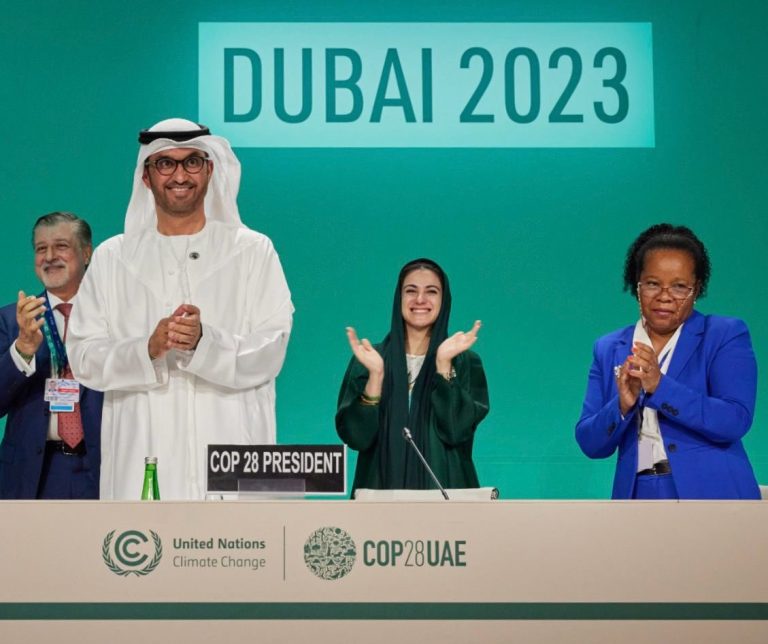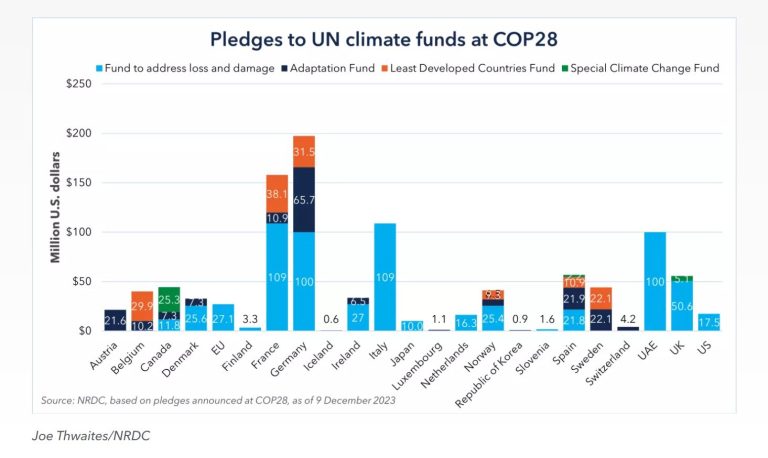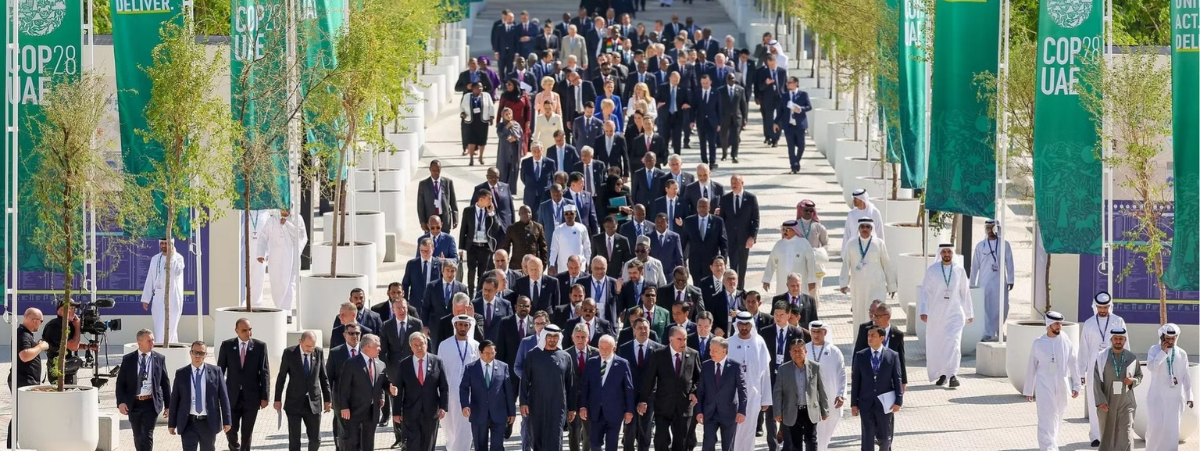Despite the controversies, several steps forward were made, including significant funding to support climate action projects.
The latest findings presented at COP28 have highlighted the alarming reality that 2023 is set to become the hottest year on record, with the global average temperature soaring to 1.46°C above the 1850-1900 baseline. A recent report, drawing on insights from 200 scientists, warns that the planet is sitting on the edge of five critical climate tipping points, with an additional three potentially reached by the 2030s if the 1.5°C threshold is breached.
As the UN Climate Summit, COP28, draws to a close, the urgency of addressing the climate crisis is more apparent than ever. The initial wave of headline grabbing announcements and commitments has given way to intense negotiations and debates over closing documents. This article explores the key agreements reached at COP28 and outlines the challenges ahead.
(Read our in-depth look at COP28 week one and the big announcements that followed here.)

COP28 Positive Progress Report
Despite the controversies, several steps forward were made, including significant funding to support climate action projects aimed at climate mitigation and restoration of damages that have occurred as a result of our changing atmospheric conditions.
The Global Climate Action Portal captured over 170 significant announcements, more than double that of COP27.
Energy Transition: Over 123 nations committed to tripling renewable energy generation capacity by 2030 and doubling the annual rate of energy efficiency improvements. The Industrial Transition Accelerator, backed by $30 million from Bloomberg Philanthropies and the COP Presidency, focuses on decarbonization solutions for heavy-emitting industries.
The COP28 Presidency launched the Net-Zero Transition Charter: Accountability Mobilization for the Private Sector, encouraging organizations to make public net-zero emissions pledges and targets, ensuring high integrity and quality, producing credible and transparent transition plans, and publishing periodic, accurate, complete, and transparent reporting on their progress.
Breakthrough Partnerships: The Breakthrough Agenda, involving 60% of global GDP, facilitates collaborations between advanced and emerging economies to boost low-carbon industrial products and support industrial transformation in developing nations.
Focus on Fossil Fuels: A coalition of 13 countries pledges to disclose fossil fuel subsidies, while major oil and gas companies commit to the Oil and Gas Decarbonization Charter, targeting net-zero operations by 2050.
Nature and Food Initiatives: Initiatives to transform food systems and protect ecosystems, including the FAO’s Global Roadmap and the Emirates Declaration, signal a commitment to addressing climate change and chronic hunger simultaneously.
Financing for Nature: A major report, ‘Finance For Nature,’ reveals that $7 trillion flowed to sectors harming nature in 2022, equivalent to 7% of global GDP. Efforts to conserve natural sinks and finance climate-nature projects have mobilized over $2.6 billion, with the private sector playing a central role.
Connecting COPs: The ‘COP28 UAE Joint Statement on Climate, Nature, and People‘ aims to enhance coordination between climate and biodiversity COPs, emphasizing the interconnectedness of environmental challenges.
Voluntary Carbon Markets: Voluntary Carbon Markets experienced a boost as banks, regulators, and standard setters actively supported initiatives to rejuvenate global carbon credit trading, addressing previous concerns surrounding credibility challenges.
The Loss and Damage Fund
During COP27, an agreement was reached among governments to establish a new fund aimed at assisting particularly vulnerable developing nations in addressing loss and damage resulting from climate change. The formal establishment of this fund took place on November 30th, 2023, marking the inaugural day of COP28. Immediately following its adoption, several governments promptly pledged support to the newly formed fund.
The quick pledges indicated a strong desire to get the fund up and running quickly. Besides government promises, the fund is open to contributions from private sources, including possible announcements of support from philanthropic foundations.
To help keep track of pledges as they come in, NRDC have created a tracker for the loss and damage fund as well as five climate funds created under the UN climate convention. It explains briefly what each fund does and tallies pledges in recent years.
View the tracker here.

What Happens Now?
Despite significant promises, the urgency for quickly reducing greenhouse gas emissions persists. The Global Stocktake (GST) was concluded at the end of COP28, marking the initiation of a new five-year cycle on climate action under the Paris Agreement. The debate around phasing out fossil fuels remains a major point of disagreement, exemplified by OPEC’s reluctance to use clear language on the matter, causing controversy and highlighting ongoing challenges.
UN Climate Change Executive Secretary Simon Stiell has emphasized the importance of ambitious efforts to reduce climate impact and support the transition. He urged negotiators to overcome obstacles, avoid gradual approaches, ensure inclusivity, and prioritize the most ambitious outcomes.
As COP28 concludes, the world awaits a significant agreement to tackle the pressing climate crisis. The summit’s achievements, including the compilation of the ‘2030 Climate Solutions: an Implementation Roadmap’ by the High-Level Champions, the Marrakech Partnership, and other partners, demonstrate a shared commitment to combating climate change. This roadmap outlines specific actions and insights from a wide range of non-Party stakeholders on effective measures that need to be scaled up and replicated. It also addresses current gaps that must be bridged to halve global emissions, tackle adaptation gaps, and enhance the resilience of four billion people from vulnerable groups and communities to climate risks by 2030. The path forward requires increased ambition, cooperation, and urgency. With COP29 set for Baku, Azerbaijan, the global community signals its continued commitment to collaborative action on climate change. Now, the challenge is to translate commitments into concrete actions that safeguard our planet and our people.
ClimateTrade on COP28
At this year’s COP we were delighted to be part of a panel discussion on behalf of the government of El Salvador. Our CEO Fran Benedito explored both the challenges and opportunities for climate financing in the Central American region. Reflecting on COP28, Benedito said:
“As you can see this year’s COP saw its fair share of controversy but despite some disappointing headlines we believe that the COP is still a positive movement and a necessary step forward in helping us keep climate change on the global agenda and course-correcting on many levels. Our biggest opportunities are still realized through climate financing and our biggest challenges such as the slow transition to clean energy remain the same. That’s why this year’s COP which was set out to be the most inclusive yet to the private sector was such an important one. I had the opportunity to connect with multiple organizations who were here to make a strong statement about facing climate related business challenges head on. As we prepare to close the year COP has given us a boost in how we can help our customers adapt, build operational resilience and make 2024 the year that climate action plays a key part in their core business operations.”








